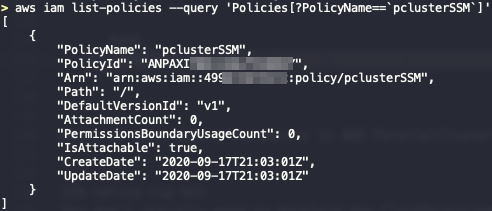- Build an IAM Policy with Cloudformation
Now you will create your custom IAM policy. To facilitate its creation, a CloudFormation template has been prepared for download and you will examine the different permissions that will be granted to your HPC cluster.
-
Download the CloudFormation template containing the custom IAM policy from the S3 bucket aws-hpc-workshops using the command
aws s3as follows:aws s3 cp s3://aws-hpc-workshops/serverless-template.yaml .For reference, the serverless-template.yaml file content is provided below. It contains the CloudFormation template that will create the IAM policy which allows cluster instances to connect to the SSM endpoints and access to the S3 bucket created in the previous steps.
See the content of serverless-template.yaml (click to expand)AWSTemplateFormatVersion: 2010-09-09 Description: This template deploys the ParallelCluster additional policies required to use SSM. Parameters: S3Bucket: Description: Choose an existing S3 bucket used to store the input/output data from jobs and save the output of SSM execution commands. Type: String Resources: pclusterSSM: Type: 'AWS::IAM::ManagedPolicy' Properties: ManagedPolicyName: pclusterSSM Path: / PolicyDocument: Version: 2012-10-17 Statement: - Effect: Allow Action: - 'ssm:DescribeAssociation' - 'ssm:GetDeployablePatchSnapshotForInstance' - 'ssm:GetDocument' - 'ssm:DescribeDocument' - 'ssm:GetManifest' - 'ssm:GetParameter' - 'ssm:GetParameters' - 'ssm:ListAssociations' - 'ssm:ListInstanceAssociations' - 'ssm:PutInventory' - 'ssm:PutComplianceItems' - 'ssm:PutConfigurePackageResult' - 'ssm:UpdateAssociationStatus' - 'ssm:UpdateInstanceAssociationStatus' - 'ssm:UpdateInstanceInformation' - 'ssmmessages:CreateControlChannel' - 'ssmmessages:CreateDataChannel' - 'ssmmessages:OpenControlChannel' - 'ssmmessages:OpenDataChannel' - 'ec2messages:AcknowledgeMessage' - 'ec2messages:DeleteMessage' - 'ec2messages:FailMessage' - 'ec2messages:GetEndpoint' - 'ec2messages:GetMessages' - 'ec2messages:SendReply' Resource: '*' - Effect: Allow Action: - 's3:*' Resource: !Sub 'arn:aws:s3:::${S3Bucket}/*' Outputs: PclusterPolicy: Description: PclusterPolicy Value: !Sub ${pclusterSSM} S3Bucket: Description: S3 Bucket name Value: !Sub ${S3Bucket} -
Deploy the CloudFormation template and create the IAM policy
The command below creates a CloudFormation stack as based on the template
serverless-template.yaml. The policy name is specified in the template file. The--stack-nameargument takes a unique name that will be associated with the stack on your account. The--parametersoption specify the input parameters for the stack (here we passS3Bucketas the key and name of the S3 Bucket as the Value). Furthermore, since you are creating IAM resources you must explicitly acknowledge that your stack template contains--capabilities. You could use the AWS Console to create this stack too.aws cloudformation create-stack --stack-name pc-serverless-policy --parameters ParameterKey=S3Bucket,ParameterValue=serverless-${BUCKET_POSTFIX} --template-body file://serverless-template.yaml --capabilities CAPABILITY_NAMED_IAM --region us-east-1The IAM policy enables access to the S3 bucket created to store the job data and SSM commands. This is provided as
ParameterValue. Make sure to provide the correct S3 bucket name. -
Once the AWS CloudFormation stack creation completes, you can confirm the IAM Policy is created by running the command below in your Cloud9 Terminal to query the policy
pclusterSSMyou just createdaws iam list-policies --query 'Policies[?PolicyName==`pclusterSSM`]'The expected command line output should look like:

In the next section, you will change your AWS ParallelCluster configuration file to add the pclusterSSM IAM policy and will apply the modified configuration to your cluster.